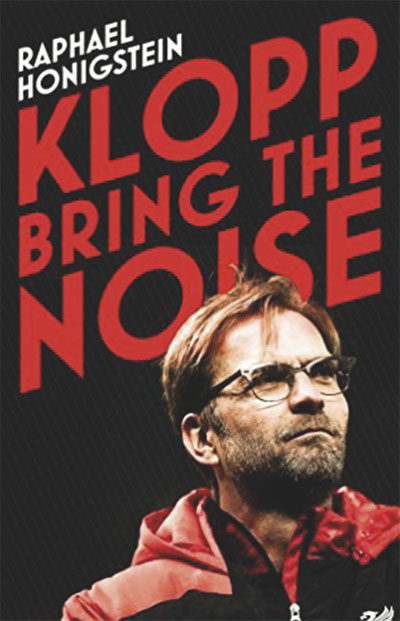
Yellow Jersey Press, £12.99
Reviewed by Huw Richards
From WSC 375, April 2018
Buy the book
Some managers seem destined for certain clubs. Klopp for Kop is a relationship not only nominatively predetermined as no appointment since Wolfgang Wolf managed Wolfsburg, but a matter of mutual temperament. Whether one likes Jürgen Klopp must now to some extent be dictated by feelings about Liverpool, but it is a fair bet that long before the two were linked by employment contract they shared the regard of most fans who like heart-on-sleeve emotion and an emphasis on the collective, and the disdain of others who do not.
Raphael Honigstein’s sophisticated biography uses the techniques employed for German football as a whole in his fine account of its modern revival, Das Reboot, drawing on copious interviews to build a picture of the man, his development and his philosophy. The structure is episodic rather than chronological, moving back and forth from Mainz to Dortmund to Liverpool and taking advantage of the long continuities of a playing and coaching career concentrated almost entirely on those three clubs.
Honigstein draws a vivid picture of a compelling personality. Klopp has traits found in many managers, not least the uber-competitiveness which as a player sometimes made him a pain to team-mates in training sessions. But this is accompanied by his trademark self-deprecation, drawing engagingly on his limits as a player when he recalls: “In my mind I was Bundesliga, but my feet were Landesliga. The result is Bundesliga 2,” the tough league in which he made 325 appearances.
Klopp’s self-awareness underpins a rare combination of emotional and analytical intelligence. His initial stopgap appointment at Mainz was greeted by journalists’ laughter, but his first coaching session left one observer wanting “to go out and play straight away”. At Liverpool, he is concerned to know the names and lives of the 80-plus non-football staff, and winds up as an unofficial counsellor to some.
Acute intellect makes him a progressive tactician from the moment of his epiphany at Mainz under Wolfgang Frank when “I realised that our system made us beat teams that had better players”. Perhaps the most striking line comes from Mike Godson of Liverpool owners Fenway Sports Group who, after a lifetime engaging with corporate big-hitters, says Klopp “really was on the same level as a corporate leader or someone you would choose to run your own company”.
There is a case that his great achievements – Mainz’s first-time promotion to the Bundesliga and Dortmund’s League and Cup double – are outweighed by the agonising near-misses such as Mainz’s three final-day failures and Dortmund’s lost Champions League final. While tapping into Liverpool’s collective psyche as no manager since the Boot Room era, he has still to score a defining triumph there.
Maybe such frustrations are the inevitable fate of a manager attuned to just-underdog clubs with passionate fanbases rather than hegemonic corporate steamrollers. But even if the very biggest trophies elude him, Pep Guardiola’s elegant throwaway that Klopp is “the best coach in the world for the spectators” is a tribute worthy of a rare and engaging talent.